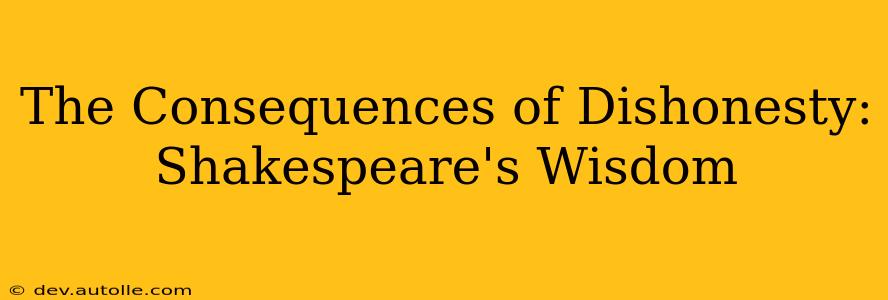Shakespeare, a master of human nature, explored the multifaceted consequences of dishonesty in his plays with unparalleled depth. His characters, driven by ambition, fear, or self-preservation, often find themselves entangled in webs of deceit, ultimately facing devastating repercussions. This exploration transcends mere plot devices; it offers timeless insights into the pervasive impact of dishonesty on individuals and society. Understanding these consequences, as illuminated by the Bard, remains profoundly relevant in today's world.
What are the consequences of dishonesty in Macbeth?
Macbeth's tragic downfall serves as a potent illustration of the destructive power of dishonesty. Driven by ambition and spurred on by his wife's manipulative influence, he commits regicide, initiating a spiral of violence and paranoia. His dishonesty isn't confined to the murder itself; it extends to his subsequent attempts to conceal his actions, leading to a complete erosion of trust and the fracturing of his relationships. The play powerfully demonstrates how dishonesty, fueled by unchecked ambition, can lead to isolation, mental anguish, and ultimately, catastrophic ruin. Macbeth's reign, built on a foundation of lies, crumbles under the weight of its own deceit, leaving him a desolate and defeated figure.
How does dishonesty affect relationships in Shakespeare's plays?
Dishonesty profoundly impacts relationships in many Shakespearean works. In Othello, Iago's insidious lies poison the relationship between Othello and Desdemona, culminating in tragedy. The insidious nature of Iago's deceit highlights how dishonesty can shatter trust, breed suspicion, and incite violence. Similarly, in King Lear, the king's flawed judgment, influenced by the manipulative flattery of his daughters, destroys his family and leads to profound suffering. These examples showcase how dishonesty, whether through direct lies or manipulative omissions, erodes the very fabric of interpersonal connections, leaving behind a trail of broken trust and irreparable damage.
Does Shakespeare explore the societal consequences of dishonesty?
Absolutely. Shakespeare's plays frequently depict the societal ramifications of dishonesty on a larger scale. The pervasive corruption in Measure for Measure, for instance, exposes the systemic consequences of dishonesty within a political system. The play's exploration of hypocrisy, injustice, and abuse of power underscores how widespread dishonesty can undermine the very foundations of a just and equitable society. Furthermore, the pervasive deceit in Julius Caesar highlights how dishonesty can destabilize political structures, leading to civil unrest and violence. The breakdown of trust and the manipulation of public opinion through propaganda ultimately result in chaos and bloodshed, demonstrating the profound societal repercussions of unchecked dishonesty.
What are some examples of dishonesty in Shakespeare's comedies?
While Shakespeare's tragedies dramatically illustrate the destructive power of dishonesty, his comedies also explore its consequences, albeit with lighter, often humorous, repercussions. In Twelfth Night, mistaken identities and fabricated stories create comical misunderstandings and complications. While these instances of dishonesty are ultimately resolved happily, they still highlight the potential for disruption and chaos that deceit can cause, even in seemingly lighthearted contexts. The playful use of deception in comedies serves as a reminder that dishonesty, even when intended to be harmless, can have unforeseen and often disruptive consequences.
Is there a moral lesson in Shakespeare's portrayal of dishonesty?
Shakespeare's portrayal of dishonesty consistently emphasizes the far-reaching consequences of deceit. While the specifics vary across plays, a central theme emerges: dishonesty ultimately leads to suffering, both for the perpetrator and those affected. Whether it's the catastrophic downfall of Macbeth or the fractured relationships in King Lear, the plays offer a powerful cautionary tale. Shakespeare's work doesn't simply condemn dishonesty; it illuminates its complex nature and its inevitable repercussions, urging audiences to reflect on the importance of honesty, integrity, and the far-reaching impact of their actions. The enduring power of his work lies in its ability to make us contemplate these timeless issues and their relevance to our own lives.

